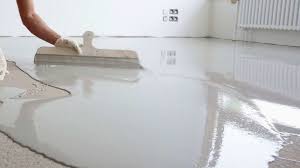Self-leveling concrete (SLC) has emerged as a revolutionary solution in the construction industry, offering unparalleled ease of installation and exceptional performance. This article explores the characteristics, applications, benefits, and considerations associated with SLC concrete, shedding light on its transformative impact on various construction projects.
Introduction to SLC Concrete:
Self-leveling concrete, as the name suggests, is a specialized form of concrete designed to level itself without the need for extensive manual spreading or troweling. It is a blend of high-quality materials, including cement, aggregates, and specialized polymers, that work together to create a fluid mixture capable of automatically achieving a level surface.
Characteristics of SLC Concrete:
Flowability: One of the defining features of SLC concrete is its exceptional flowability. The mix designed to spread and level itself over a surface, filling voids and irregularities to create a smooth and even finish.
Rapid Setting: SLC concrete typically has a rapid setting time, allowing for quick installation and minimizing downtime. This is particularly advantageous in fast-track construction projects where time is of the essence.
High Compressive Strength: Despite its self-leveling properties, SLC concretes maintains high compressive strength, ensuring the durability and longevity of the finished surface.
Minimal Shrinkage: SLC concrete formulations often include additives to minimize shrinkage during the curing process. This helps prevent cracks and ensures a stable and resilient surface.
Applications of SLC Concrete:
Floor Leveling: The primary application of SLC concrete is floor leveling. It is widely used to create smooth and level surfaces in both residential and commercial settings. SLC can applied over existing substrates, including concrete, plywood, and tile.
Underlayment for Flooring: SLC concrete serves as an ideal underlayment for various types of flooring, including tiles, hardwood, and carpet. Its self-leveling properties ensure a flawless foundation for the final flooring material.
Renovation Projects: SLC concrete is commonly employed in renovation projects where existing floors need to be leveled or resurfaced. Its rapid-setting nature is advantageous in scenarios where minimal downtime is crucial.
Radiant Floor Heating Systems: The flowable nature of SLC makes it compatible with radiant floor heating systems. It can be used to encapsulate heating elements, ensuring even heat distribution across the floor surface.
Benefits of SLC Concrete:
Efficiency and Time-Saving: The self-leveling nature of SLC concrete significantly reduces the time and labor required for floor leveling. It eliminates the need for extensive manual labor, allowing for faster project completion.
Precision and Accuracy: SLC concretes provide a high level of precision and accuracy in achieving a level surface. This is particularly important in applications such as flooring, where an uneven surface can lead to issues with the final floor covering.
Compatibility with Various Substrates: SLC can applied over a variety of substrates, including concretes, wood, and existing tile. This versatility makes it a go-to solution for a wide range of projects.
Minimized Disruption: The rapid-setting properties of SLC concretes minimize disruption to ongoing activities in commercial or residential spaces. This is especially beneficial in environments where continuous operations are critical.
Enhanced Durability: SLC concrete formulations engineered to deliver high compressive strength and durability. The resulting surface can withstand heavy foot traffic and other loads, making it suitable for diverse applications.
Considerations and Installation Tips:
Surface Preparation: While SLC is self-leveling, proper surface preparation is crucial. Surfaces should be clean, free from contaminants, and primed to ensure optimal adhesion.
Mixing and Pouring: Follow manufacturer guidelines for mixing ratios and pouring techniques. SLC is typically mixed with water to achieve the desired consistency, and it should be poured strategically to achieve an even distribution.
Thickness Considerations: The thickness of the SLC application will depend on the specific project requirements. Ensure that the thickness meets the manufacturer’s recommendations and the needs of the flooring system.
Temperature and Humidity: Ambient temperature and humidity levels can impact the curing time of SLC. It is essential to follow guidelines regarding environmental conditions during and after installation.
Conclusion:
Self-leveling concrete has revolutionized the way floors are leveled and surfaces are prepared in the construction industry. SLC concrete’s flowable nature, rapid-setting capabilities, and compatibility with various substrates make it a versatile and efficient solution for a wide range of applications. As advancements in concrete technology continue, SLC stands as a testament to innovation, providing construction professionals with a reliable and high-performance material for achieving smooth, level, and durable surfaces in diverse projects. Whether in residential renovations, commercial spaces, or industrial settings, self-leveling concrete is poised to remain a cornerstone in the pursuit of efficiency, precision, and excellence in construction practices.

